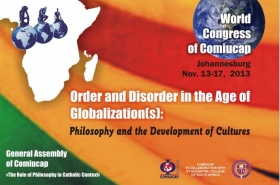Dal 13 al 17 novembre 2013 si svolge in Johannesburg con il patrocinio del Pontificio Consiglio della Cultura il Congresso Mondiale e l'Assemblea Generale del COMIUCAP (Conférence Mondiale des Institutions Universitaires Catholiques de Philosophie) sul tema Order and Disorder in the Age of Globalization(s).
Di seguito l'Indirizzo di Saluto del Cardinale Presidente all'incontro (see English text below).
Il keynote del Rev.mo Segretario del Dicastero, Mons. Adoukonou apparirà qui. Per ulteriori dettali si è invitati a visitare il sito COMIUCAP
Vaticano, 12 novembre 2013
Saluto di Sua Eminenza Reverendissima
Il Signor Cardinale Gianfranco Ravasi
È un piacere rivolgere un saluto cordiale agli organizzatori, ai relatori e ai partecipanti all’Assemblea Generale della COMIUCAP dedicata al tema Order and Disorder in the Age of Globalization(s), che vedrà la presenza del Segretario del Consiglio, S.E. Mons. Barthélemy Adoukonou.
Mi è gradito, in particolare, ricordare l’incontro dei Membri e Consultori del Pontificio Consiglio della Cultura “One People of God Within the Diversity of Cultures”, che ebbe luogo in questo stesso Saint Augustine’s College, dal 27 al 30 October 2004, con la presenza del mio predecessore, il Cardinale Paul Poupard.
I temi dei due incontri, a distanza di anni e di prospettive, affrontano la grande sfida della globalizzazione nel mondo di oggi: come conservare armonicamente unità e diversità, identità locale e appartenenza a un mondo sempre più interdipendente e collegato attraverso le reti sociali, i mezzi di comunicazione, i flussi commerciali e i mercati finanziari.
È un mondo in cambiamento e in crescita, con le tensioni che ciò sempre comporta. Ma proprio questo mondo offre a tutti noi possibilità inedite di incontro e di annuncio del Vangelo. Come il mondo nel quale Paolo e i primi apostoli si avventurarono per portare la Buona Notizia del Regno, anche questo mondo globalizzato permette che si avveri l’augurio del salmo 147: “il suo messaggio corre veloce”, attraverso reti di comunicazione e di scambi tra gli uomini.
In questo contesto, segnato dalla globalizzazione, la Chiesa desidera promuovere la diversità culturale nell’unità della fede in Cristo, e disseminare una cultura della diversità e della fraternità. Lo sviluppo sostenibile, indispensabile per il futuro del continente africano, ha una fondamentale dimensione culturale. Per questo, i valori culturali presenti nelle tradizioni africane che servono alla dignità della persona hanno un ruolo fondamentale. In quanto valori culturali, esprimono l’anima di un popolo, e vanno promossi come punti di ancoraggio per la proclamazione del Vangelo. La Chiesa possiede un ricco patrimonio di valori tradizionali che nel corso dei secoli sono stati modellati dalla fede e può fare il suo contributo alle sfide della riconciliazione e della pace.
L’azione dello Spirito Santo costruisce la Chiesa come l’unica famiglia di Dio nella diversità delle culture, e colloca il Vangelo al centro della pastorale della cultura e del dialogo con tutti gli uomini di buona volontà nelle loro culture, specialmente quelle segnate dall’indifferenza religiosa.
Con questi sentimenti, rinnovo i miei auguri ai partecipanti al Convegno, augurando a tutti di contribuire a costruire l’unità del popolo di Dio nella diversità delle culture del mondo.
Gianfranco Card. Ravasi
Presidente
Vatican City, 12 November 2013
Message of His Eminence
Cardinal Gianfranco Ravasi
To the participants at the International Conference of the COMIUCAP
Order and Disorder in the Age of Globalization(s)
It is for me a pleasure to send my cordial greeting to the organisers, speakers and participants of the General Assembly of the COMIUCAP dedicated to the theme Order and Disorder in the Age of Globalization(s), which will see the presence of the Secretary of the Council, H.E. Mons. Barthélemy Adoukonou.
This is for me a particular occasion to recall the meeting of Members and Consultors of the Pontifical Council for Culture on the theme “One People of God within the Diversity of Cultures”, which took place in this same Saint Augustine College, from 27 to 30 October 2004 in the presence of my predecessor, Cardinal Paul Poupard.
The themes of both meetings, across the years and across different viewpoints, encounter the great challenge of globalisation today: how to harmoniously conserve unity and diversity, local identity and belonging in a world that is evermore interdependent and connected through the social networks, the communications media, commercial and financial movements.
This is a world in change and in growth, with the tensions that this always brings. And it is this same world that offers to all of us a new opportunity to meet and proclaim the Gospel. As the world into which St. Paul and the first apostles immersed themselves to bring the Good News of the Kingdom, so too this globalised world allows the fulfilment of the Psalm 147: “His word flashes to the earth”, through the networks of communication and exchanges between people.
In this globalised context, the Church desires to promote cultural diversity in the unity of faith in Christ and spreads a culture of diversity and fraternity. Sustainable development – indispensable for the future of the African Continent – has a fundamental cultural dimension. For this, the cultural values present in the African traditions which serve the dignity of the person have a fundamental role. In as much as they are cultural values, they express the soul of a people, and should be promoted as points of reference for the proclamation of the Gospel. The Church possesses a rich patrimony of traditional values which in the course of centuries have been modelled by the faith and can make a contribution to the challenges of reconciliation and peace.
The action of the Holy Spirit constructs the Church as unique family of God in the diversity of cultures and places the Gospel at the centre of the pastoral approach to culture and dialogue with all people of good will in their cultures, especially those that are marked by religious indifference.
With these sentiments, I renew my congratulations to the participants at the Conference, praying that you will all contribute to constructing the unity of the people of God in the diversity of the cultures of the world.
Gianfranco Card. Ravasi
President




